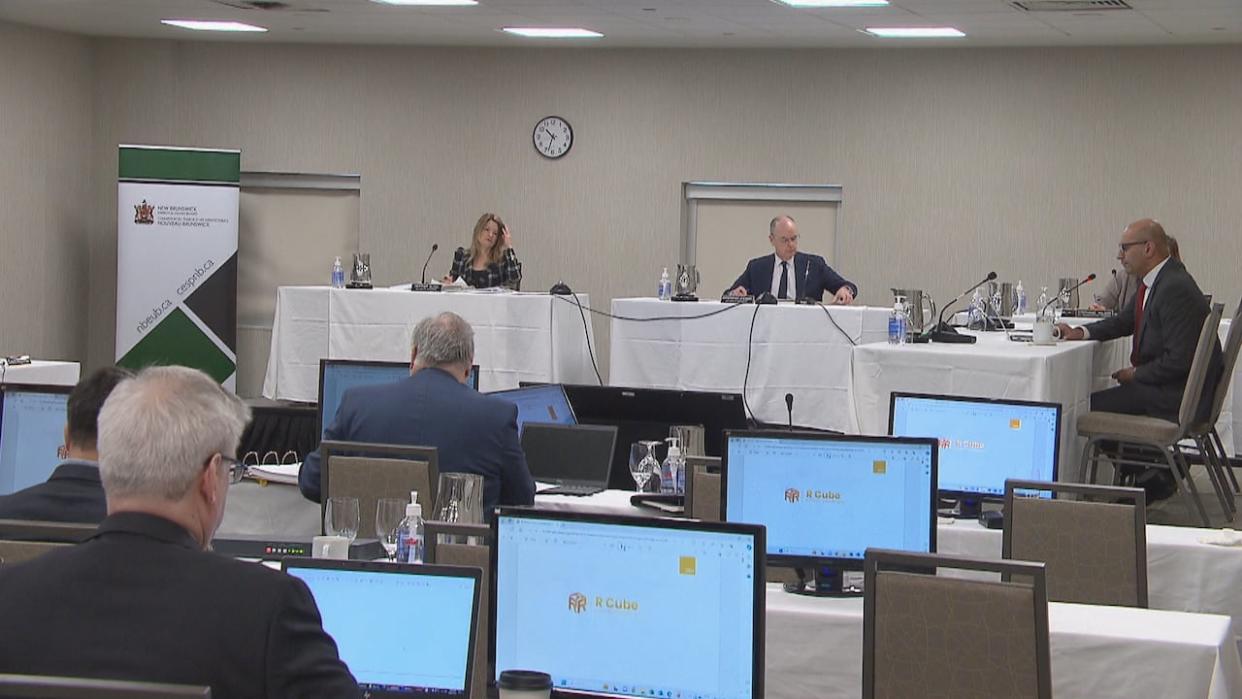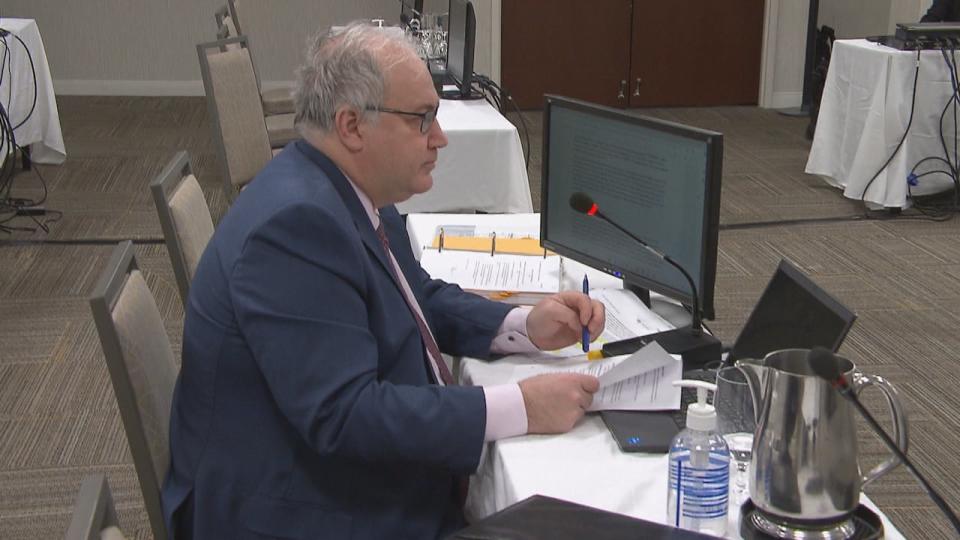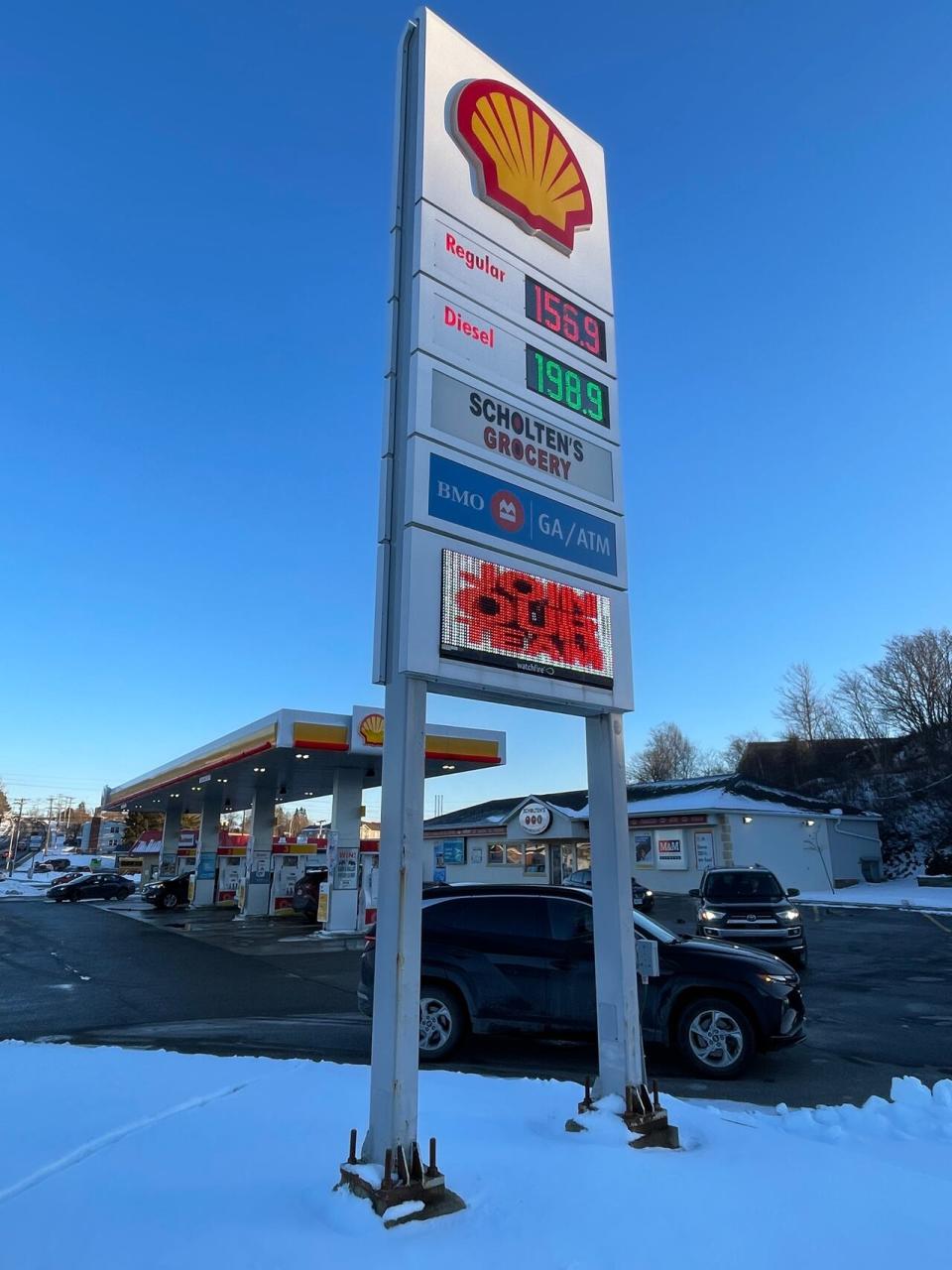Slash clean fuel charges on N.B. consumers, public intervener recommends

The man appointed by the New Brunswick government to defend the public interest at the Energy and Utilities Board hearings is urging the body to cut the amount consumers are being charged for federal clean fuel regulations by more than half in an upcoming decision.
But oil industry representatives and retailers are cautioning that would be a mistake and are asking for the EUB to resist making major changes.
In closing arguments at the end of a two-day review of a formula adopted by the EUB last year to set the cost of federal clean fuel rules in New Brunswick, public intervener Alain Chiasson said evidence has convinced him amounts for the "carbon cost adjuster" are set too high and are costing consumers too much at the pump.
The current formula, which was developed by the consulting company Grant Thornton, resets every week.
This week it is allowing oil companies to add 5.22 cents per litre to the price of gasoline and 5.82 cents to the price of diesel to consumers in New Brunswick to pay for the cost of the federal rules that took effect nationally in July.
"The public intervener submits that the cost of carbon adjustor should be between one cent to two cents per litre instead of the higher cost as proposed by the Grant Thornton methodology," said Chiasson in his closing remarks at the board hearing.

New Brunswick public intervener Alain Chiasson told an EUB hearing that clean fuel charges to consumers in New Brunswick are too high and should be cut by more than half. (Ian Bonnell / CBC)
Federal clean fuel rules are separate from carbon charges and are aimed at forcing oil refineries and fuel importers to lower the "carbon intensity" of the products they sell and the methods they use to refine them.
In 2022 the New Brunswick government passed legislation to allow oil companies to pass any costs caused by them onto consumers and instructed the Energy and Utilities Board to determine what those costs might be.
The EUB is currently reviewing the controversial formula it adopted for that purpose last year after agreeing to the recommendation made by Grant Thornton.
Angela Brown, a partner in Grant Thornton's office in Newfoundland and Labrador, said in her consultations with oil companies she was told they would likely have to import significant amounts of expensive "renewable diesel" to comply with the federal policy as rules tighten in future years.
Brown developed a formula to estimate the cost of that which the Energy and Utilities Board adopted as a "proxy" estimate of the cost of the federal policy last year.
"I did discuss with industry participants what their most likely pathway to compliance would be ... and for the most part they all acknowledge ... the renewable diesel pathway would be the most likely," said Brown in testimony Monday.
But Chiasson told the board that other than Brown's private consultations with industry no oil company has come forward to show what its costs actually are or whether there are any real plans to import renewable diesel.
That, he said, made relying on Grant Thornton's formula problematic.

The Scholten Group operates several fuelling stations in New Brunswick. The company said one wholesaler has been charging clean fuel amounts close to levels currently allowed by the board that are passed through to customers. It is worried those charges won't go away if the board lowers what consumers can be charged. (Robert Jones / CBC)
"We feel that the approach and formula proposed by Grant Thornton is overstating the cost of the carbon adjustor. This creates windfall gains to regulated motor fuel suppliers at the consumer's expense," said Chiasson.
That view was echoed by Timothy Auger with the group Advanced Biofuels Canada. He repeated claims he made during testimony on Monday that there are multiple low cost options available to oil companies to meet clean fuel rules.
He said maximizing the blending of ethanol in gasoline or importing cheaper biodiesel rather than expensive renewable diesel are both viable alternatives that he said Grant Thornton has ignored.
"The Grant Thornton calculator as developed, overstates consistently the net cost of the CFR [clean fuel regulation] that is then passed on to fuel consumers by way of the carbon cost adjustor," said Auger.
"It is Advanced Biofuels Canada's position that the board seriously reconsider the Grant Thornton formula in its current form."
But petroleum industry participants disagreed with making major changes.
No oil company appeared at the hearing to give evidence but the Canadian Fuels Association was present and said that clean fuel charges in New Brunswick are being set fairly and the existing formula should not be adjusted significantly in a new ruling.
Carol Montreuil noted that a national carbon credit trading system is being put together by the federal government that will eventually establish the true costs of the clean fuel policy. But until that is fully up and running New Brunswick's current formula should be maintained, he said.

Carol Montreuil with the Canadian Fuels Association told the EUB current clean fuel charges are reasonable and the formula used to calculate them should not be abandoned. (Radio-Canada)
"The board's prior decision appropriately established a fair and reasonable cost of carbon adjustor specific to the circumstances facing regulated markets in Atlantic Canada," said Montreuil.
"It has been working well and it's understood by the parties. It should be maintained in place until the Canadian carbon credit market matures."
Jerry Scholten, who operates a number of New Brunswick service stations through the Scholten Group, also urged the board to avoid making major changes.
"It is important that the board get this right or, at the very least, err on the side of caution," said Scholten.
New Brunswick regulates the maximum price retailers can charge consumers for fuel and Scholten told the hearing at least one wholesale supplier he deals with has been charging his stations clean fuel surcharges that are similar to amounts calculated by the board's formula.
He fears that would continue at his expense if approved amounts were reduced, and lowered what he can pass through to customers.
"Independent retailers are not in the position to accept any further reduction in margins that will most certainly come if CCA [carbon cost adjuster] is not enough to cover primary supplier compliance costs," said Scholten.
"Just like all New Brunswickers, we are in favour of fair retail pricing. But pushing costs onto retailers will likely have substantial consequences."
The Conservation Council of New Brunswick said because there has been no direct evidence given by oil companies at board hearings about their renewable diesel plans, it had concerns about the board basing its clean fuel costing formula on that uncertain issue.
"Based on the evidence that has been brought forward in this proceeding and in the past proceeding ... that assumption has not been substantiated or justified to our satisfaction," said Konstantina Northrup on behalf of the environmental group.
"For that reason the Conservation Council of New Brunswick is not satisfied that that is an approach that is necessarily fairest and most reflective of the actual burden that ought to be passed to consumers."
The EUB's Christopher Stewart, who chaired the hearing, said the board would consider all the submissions but hinted it may take time to "wrestle" with the issue and come to a decision.
"These matters are complex and they are difficult," he said in adjourning the meeting.


